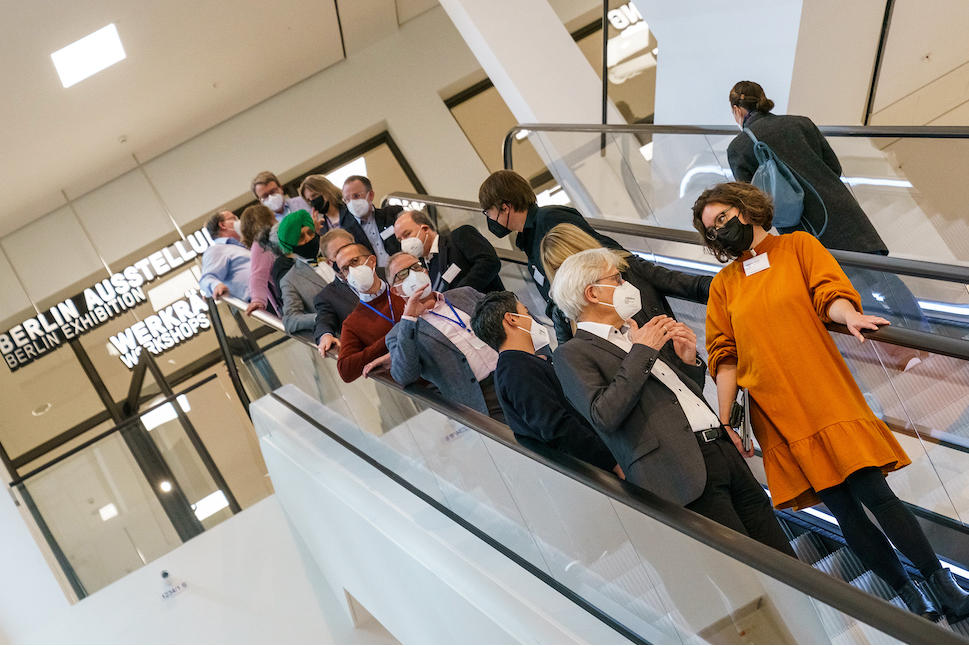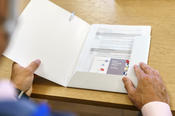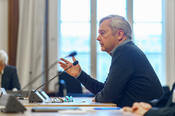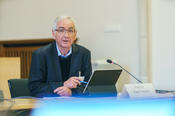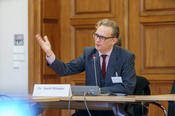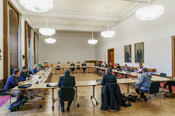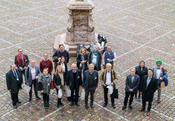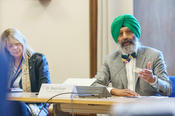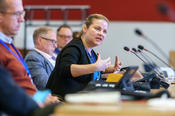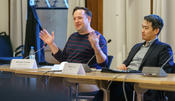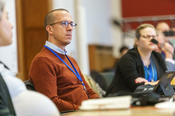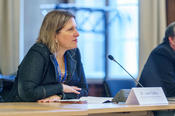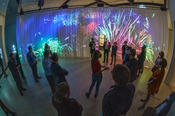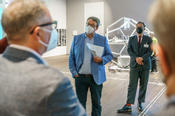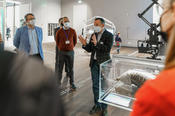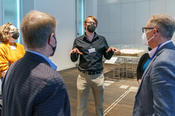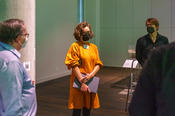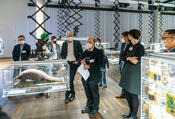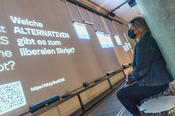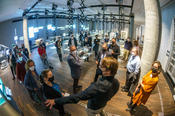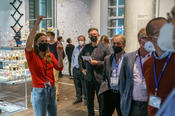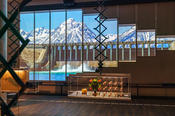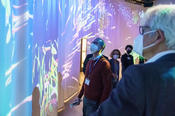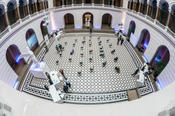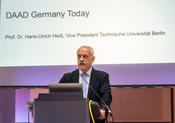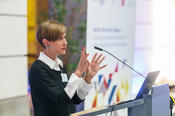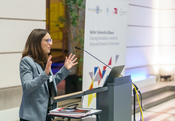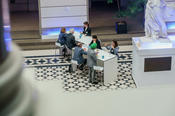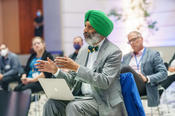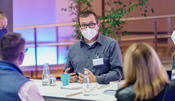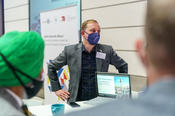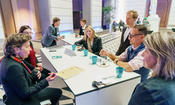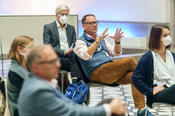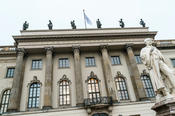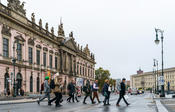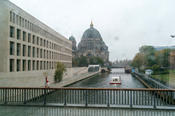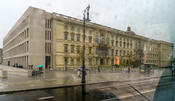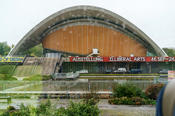Berlin Alliance Arouses International Interest
An international delegation visited the Berlin Excellence Alliance and learned about cooperative approaches to current challenges worldwide
Oct 27, 2021
International visit to the Berlin University Alliance: Under the motto "Germany Today," a delegation of U.S. and Canadian universities also learned about the excellence alliance.
Image Credit: Michael Fahrig
Environmental changes, aging populations, and the Covid-19 pandemic are just a few of the challenges societies are facing around the world today. Approaches to solutions can only be developed across disciplinary and institutional boundaries and in international cooperation. Exchange and cooperation with society also offer new perspectives on scientific topics. These are precisely significant goals of the Berlin University Alliance (BUA). Representatives from US and Canadian universities and funding organizations were able to see this for themselves in mid-October.
The delegation visited universities in Dresden, Jena, Leipzig as well as the Berlin excellence alliance consisting of Freie Universität Berlin, Humboldt-Universität zu Berlin, Technische Universität Berlin, and Charité – Universitätsmedizin Berlin according to the slogan "Germany Today" as part of a trip financed and coordinated annually by the German Academic Exchange Service (DAAD - Deutscher Akademischer Austauschdienst). The tour focused on dedicated forms and cooperation approaches of German universities and research institutions to cope with current societal tasks.
The fact-finding visit gave participants an overview of, among other things, the German academic landscape and research system, current developments, innovative projects, and structural reforms, as well as insights into institutional internationalization strategies and information about cooperation between universities in strategic networks.
"It is an unusual sight: The president of one university welcoming a delegation on the premises of another university – this is just a small detail that highlights the change and opportunities facilitated by the Berlin University Alliance," said Christian Thomsen as he – in his role as president of Technische Universität Berlin and member of the BUA's Board of Directors – welcomed participants to Humboldt-Universität zu Berlin on behalf of the excellence alliance. Together with Peter A. Frensch, president's representative for the Berlin University Alliance at Humboldt-Universität zu Berlin, and member of the Executive Board of the BUA, he introduced the four partner institutions – Freie Universität Berlin, Humboldt-Universität zu Berlin, Technische Universität Berlin, and Charité – Universitätsmedizin Berlin – and their idea of an integrated research environment in the capital.
"It was here in this hall that Alexander von Humboldt gave his famous Cosmos readings," explained Peter A. Frensch. There he built an arc encompassing the entire world and all disciplines of science. The BUA also pursues "the approach of internationality and joint research across disciplinary and institutional boundaries." Examples of this are the Grand Challenge Initiatives. With these funding lines, the excellence alliance addresses current societal challenges worldwide that can only be solved jointly and in international cooperation. The first two initiatives address the topics of social cohesion and global health.
For the Berlin University Alliance, it was the first visit of an international delegation since the review within the excellence strategy of the German federal and state governments, but for some of the participants it was not the first visit to Berlin. Even though the stay was about 30 years ago, the memory of Berlin at that time was still very much alive and the amazement at the changes since then was all the greater. "It's wonderful to be back here and see the universities so united," said Brett Fairbairn, president of Canada's Thompson Rivers University. Michael Kusiak, director in the Office of Contract and Grant Administration at the University of California San Diego, also remembered the time shortly after the fall of the Berlin Wall: "I walked down the street called 'Unter den Linden' back then and marveled at what was happening in Berlin. It's great to be back here and see the development."
During the first round of welcoming and presentation of the Berlin excellence alliance, the participants already had the chance to ask questions directly to the representatives of the BUA's leadership committees. Among other things, they were interested in international networks, the exchange between science and society, the German scientific system, and joint funding opportunities.
The delegation gained insights into Berlin's seven clusters of excellence at the Humboldt Lab, where they were able to view the exhibition "After Nature," which was co-funded by the BUA. "How are climate change, species extinction, and the crisis of democracy connected?" is the question raised by the exhibition. It shows the links between political systems and nature, and how environmental and resource issues have a huge impact on all political systems. The exchange between science and society is being rethought in the Humboldt Lab as well as in the Berlin University Alliance and the seven interdisciplinary research projects. All clusters introduce themselves in the 150 square meter foyer: Math+, Matters of Activity: Image Space Material, NeuroCure, SCIoI – Science of Intelligence, Scripts, Temporal Communities und Unifying Systems in Catalysis (UniSysCat).
"The meeting was a great way to gain new insights into many topics, share current challenges, and make new contacts," says Anna Lebed from the BUA's Berlin Center for Global Engagement (BCGE). "With such an enthusiastic group, it was fun to discuss, exchange ideas, and also laugh." Together with her colleague Sarah Wessel, she presented the work of the BCGE as well as funded projects at the round table on "science diplomacy" during the last program item of the day.
What exactly does the term 'science diplomacy' mean? What challenges arise in the cooperation between science and politics? What role do scientific institutions play in this, and how can we strengthen cooperation? What is the best way to organize cooperations with the 'Global South'? "People not only asked practical questions about, for example, the organization of calls for proposals, funding opportunities, and project selection, but were also interested in the individual projects," says Anna Lebed. Many guests were fascinated by the book "Corona and Work around the Globe", the result of the BCGE-funded project of the same name.
At a total of four of these round tables, visitors were able to delve deeper into the goals and processes of the excellence alliance. At this point in the program, they also got to know another partner institution first-hand. The atrium of Technische Universität Berlin offered enough space and showed another side of Berlin's university landscape. The delegation was welcomed by Christine Ahrend, vice president for Research, Appointment Strategy, Knowledge & Technology Transfer of Technische Universität Berlin and member of the Executive Board of the BUA, with a presentation on "Transdisciplinarity in Research".
"It was fascinating that the idea of our 'Grand Challenge Initiatives' is easy to communicate – because it is so understandable," says Christian Richter, the BUA's scientific coordinator for 'Social Cohesion'. Both topics – 'Social Cohesion' and 'Global Health' – are also on the agenda at the delegation's home universities – locally influenced and with a distinct perspective. "The very open and keen discussions were profitable for both sides," says Christian Richter. He was supported by Rico Neumann of Technische Universität Berlin, who is doing research on the 'Social Cohesion and Civil Society. Interaction Dynamics in Times of Disruption' project, and Nora Anton from Charité Global Health.
Science communication and open science are further objective areas of the Berlin University Alliance on which visitors were able to exchange ideas with contact persons from the BUA. Fabian Kruse, the BUA's program manager for science communication, presented the so-called experimental laboratories. In these interdisciplinary projects of research groups, communicative ideas are developed with an innovative approach and new exchange formats are tested for target groups that have been poorly covered so far. The visitors from North America learned about different approaches from two projects on science communication by Vera S. Rotter, professor at the Faculty of Process Sciences at Technische Universität Berlin, and Ariane Beier, coordinator of school activities in the cluster of excellence 'Math+'. They were also given a brief insight into the open science activities of the four partner institutions.
"The participants were interested both in the methods of the two example projects and in the understanding of research partnerships," emphasizes Stefan Skupien, scientific coordinator for 'Open Science' in the BUA's 'Advancing Research Quality and Value' objective. "The discussion about the importance of open access, journal assurance of quality, and access to publications for researchers from the Global South was as exciting for us as it was for the delegation."

